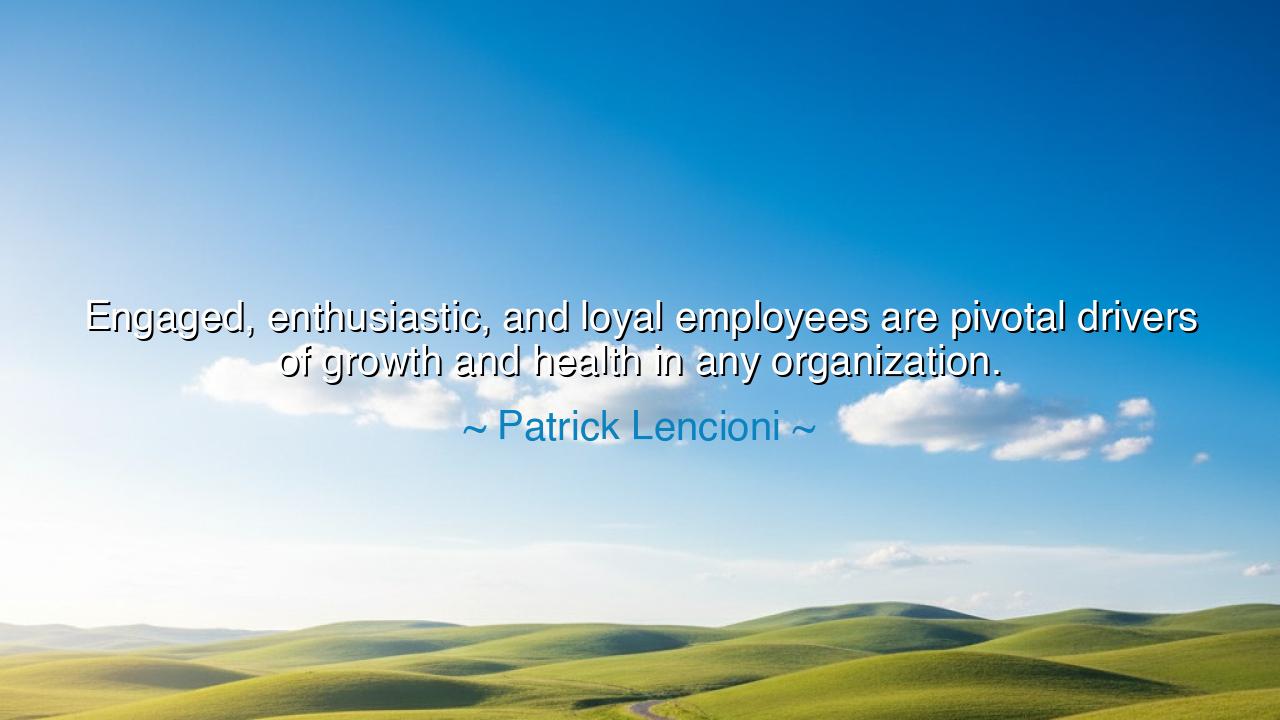
Engaged, enthusiastic, and loyal employees are pivotal drivers of
Engaged, enthusiastic, and loyal employees are pivotal drivers of growth and health in any organization.






The wise teacher of leadership, Patrick Lencioni, once proclaimed: “Engaged, enthusiastic, and loyal employees are pivotal drivers of growth and health in any organization.” His words, though born in the modern halls of commerce, carry the timeless weight of truth that would have been known even to the rulers of empires and the builders of temples. For what is an organization, if not a gathering of souls united by purpose? And what is growth and health, if not the flourishing of those souls working in harmony toward a shared vision? Lencioni reminds us that the true strength of any enterprise—whether a kingdom, a company, or a community—lies not in its wealth, nor in its weapons, nor even in its leader, but in the spirit of its people.
In the ancient world, this truth was not unknown. The generals of Rome understood that a legion’s victory was determined not merely by its armor or its strategy, but by the loyalty and devotion of its soldiers. A legionnaire who believed in his commander would march through storm and desert without complaint. The same was true of the artisans of Athens, whose enthusiasm for their craft gave rise to temples that still stand after millennia. And it was true of the scribes of Alexandria, whose engagement in their pursuit of knowledge filled the greatest library the world had ever known. In every age, the vitality of a people has depended upon the hearts of those who serve within it.
When Lencioni speaks of engagement, he speaks of something far deeper than mere labor. An engaged worker is not one who works because he must, but because he believes. He finds meaning in his effort, purpose in his role, and joy in the success of the whole. Such a person becomes like the root of a great tree—unseen yet indispensable, drawing nourishment for all. Enthusiasm, too, is no small thing, for it is the flame that kindles innovation, that transforms ordinary labor into artistry. A task done with enthusiasm multiplies its worth, for it spreads courage and energy to all who witness it. And loyalty—the third pillar of Lencioni’s wisdom—is the sacred bond that holds the whole together. Without loyalty, an organization is like a ship with a cracked hull; no matter how fine its sails, it will sink when the waves grow fierce.
Consider the tale of Ernest Shackleton, the explorer who, in 1914, set sail for Antarctica with dreams of crossing its frozen heart. His ship, Endurance, was crushed by ice, leaving his crew stranded in a sea of deathly cold. Yet not one man perished. Why? Because Shackleton’s men were bound to him by trust, loyalty, and belief. They followed him not out of fear, but out of engaged purpose—a shared commitment to survival and honor. Shackleton’s leadership transformed despair into unity, and their devotion to one another became their salvation. In that frozen wasteland, Lencioni’s truth lived and breathed: enthusiastic and loyal people sustain the life of any enterprise, even when all material hope has failed.
In our own age, when organizations rise and fall with startling speed, this ancient lesson remains unchanged. The cleverness of leaders, the brilliance of technology, the abundance of resources—all are meaningless without the human spirit that animates them. A company may have the finest plans, but if its people are weary, cynical, or forgotten, it will rot from within. Yet even a humble enterprise, guided by purpose and inhabited by devoted hearts, will thrive. For the health of an organization, like the health of the body, depends upon its inner organs, not its outer armor.
The origin of Lencioni’s words lies in his lifelong study of teams, trust, and leadership. He saw that the success of any endeavor rests upon human connection—the unseen web of trust, respect, and commitment that binds people to one another and to a shared dream. He wrote these words not to flatter workers, but to awaken leaders: to remind them that their first duty is not to systems or profits, but to people. For when the people are strong in heart, all other things—innovation, performance, endurance—will follow. But when the people grow disheartened, no wealth or strategy can save the house from collapse.
Therefore, let this be the lesson passed down: if you are a leader, seek first to inspire engagement, to kindle enthusiasm, and to earn loyalty. Treat every person not as a tool, but as a partner in purpose. Give them not only tasks, but meaning. Praise their efforts; trust their integrity; share with them the vision that guides you. And if you are one who serves, bring your whole self to the work—your creativity, your energy, your faith. For in doing so, you become the lifeblood of your organization, the invisible force that keeps it growing, thriving, and alive.
Thus, Patrick Lencioni’s words stand as both wisdom and warning. They remind us that no structure, however mighty, can endure without the living hearts that uphold it. Growth without human spirit is hollow, and health without loyalty is fleeting. But when engagement, enthusiasm, and loyalty join hands, they form a trinity of power stronger than any wall or sword. Let every leader remember this truth, and every worker take pride in it: that together, united in spirit and purpose, we become not just employees, but builders of something eternal.






AAdministratorAdministrator
Welcome, honored guests. Please leave a comment, we will respond soon